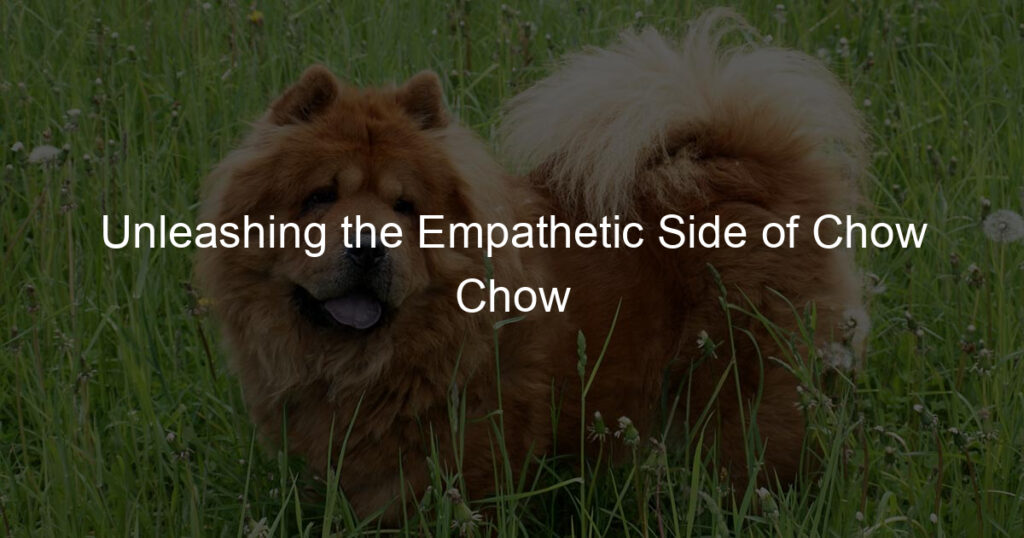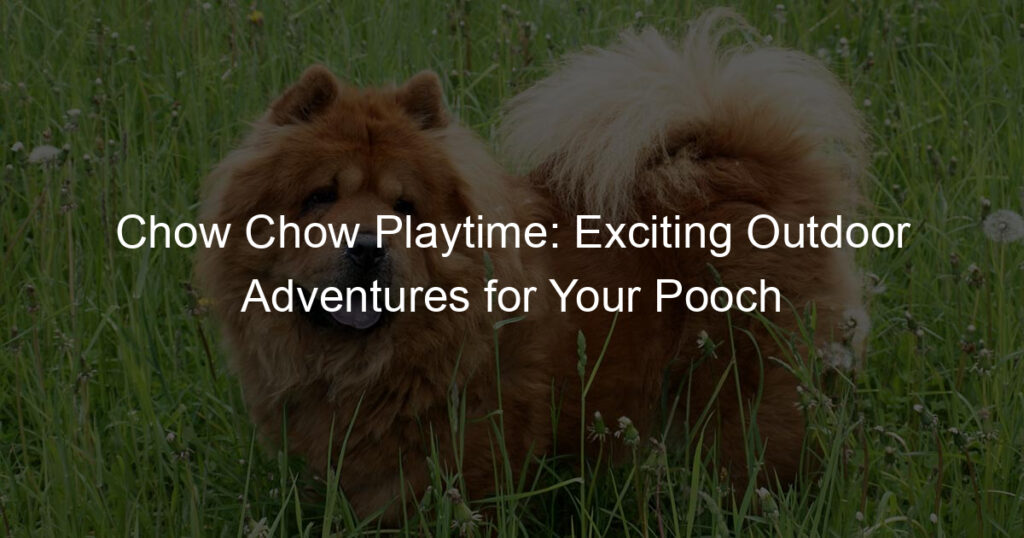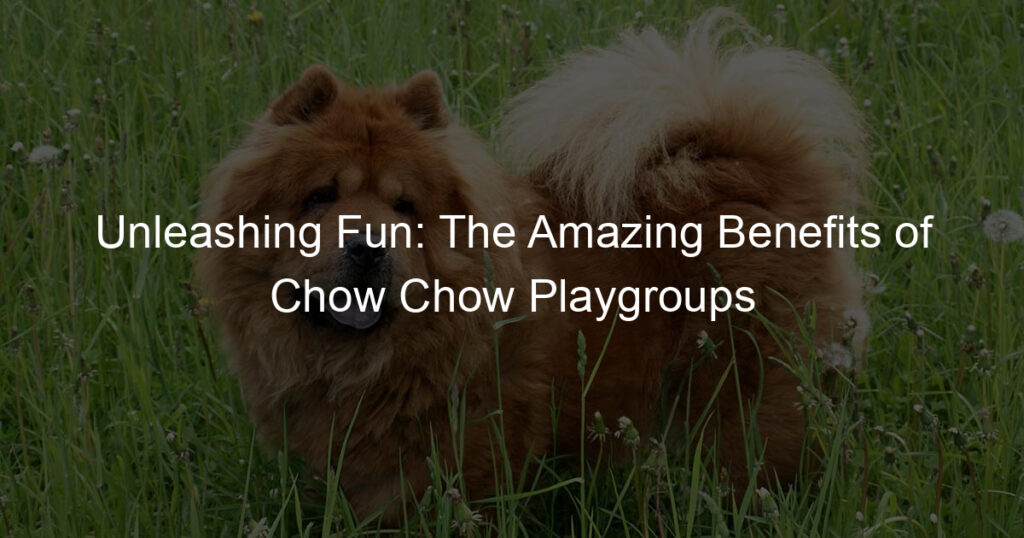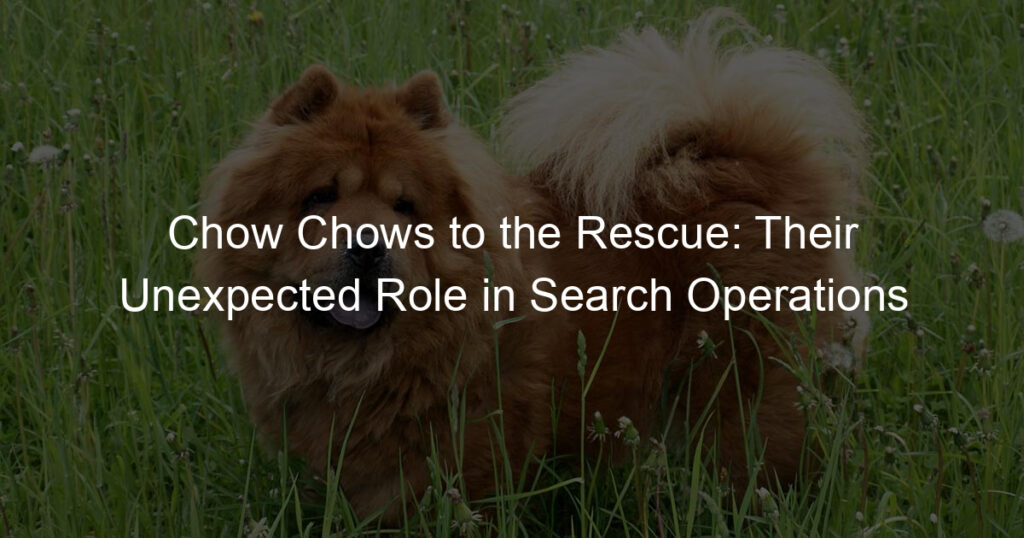Introduction: Understanding Chow Chow Behavior
Chow Chows are a unique breed of dogs, known for their lion-like appearance and aloof demeanor. Understanding their behavior is crucial for any Chow Chow enthusiast or potential owner. This article will provide an overview of the Chow Chow breed characteristics and the importance of emotional intelligence in dogs.
- Overview of the Chow Chow breed characteristics
- Importance of emotional intelligence in dogs
The Chow Chow, often simply referred to as the Chow, is a dog breed originally from northern China. They are known for their distinctive blue-black tongues and thick double coat, which comes in various colors including red, black, blue, cinnamon, and cream. The breed is characterized by a sturdy build, deep-set eyes, and a large head with a broad, flat skull.
Chows are typically well-mannered, quiet, and independent. They are known for their aloofness and can be standoffish with strangers. However, they are also fiercely loyal to their families and can be quite protective. They require consistent training and socialization from a young age to ensure they grow into well-rounded dogs. Learn more about Chow Chows on Wikipedia.
Emotional intelligence refers to the ability to understand and manage emotions. In dogs, it involves the ability to read and respond to the emotions of their human companions and other animals. Dogs with high emotional intelligence can be more responsive to training, more adaptable to different situations, and generally more pleasant to be around.
Chow Chows, like all dogs, can benefit greatly from being trained to understand and respond to emotional cues. This can help them become more sociable, reduce potential aggression, and improve their overall behavior. Emotional intelligence in dogs is not just about training; it’s also about building a strong, trusting relationship between the dog and its owner.
In the following sections, we will delve deeper into the specifics of the Chow Chow breed, their capacity for empathy, and how to train an emotionally intelligent dog. Stay tuned to learn more about these fascinating creatures and how to foster a positive relationship with them.
Chow Chow Breed Information
The Chow Chow is an intriguing breed, known for its lion-like appearance and unique personality traits. In this section, we will delve into the physical characteristics of this breed, providing a comprehensive understanding of its features and common health issues.
Physical Characteristics
- Description of the Chow Chow’s physical features: The Chow Chow is a medium-to-large sized dog breed, typically weighing between 45 to 70 pounds. They stand about 17 to 20 inches tall at the shoulder. One of their most distinctive features is their blue-black tongue, a trait shared only with the Chinese Shar-Pei. They have a dense double coat that can be either smooth or rough, and comes in various colors including red, black, blue, cinnamon, and cream. Their eyes are almond-shaped, giving them a somewhat stern expression. The Chow Chow’s ears are small and rounded, standing erect on the top of their broad skull. Their tail is another distinctive feature, as it curls over their back.
- Common health issues in Chow Chows: Like all breeds, Chow Chows are prone to certain health conditions. These include hip and elbow dysplasia, a common skeletal condition that can lead to discomfort, pain, and in severe cases, lameness. They are also prone to eye-related issues such as entropion, where the eyelid rolls inward, causing irritation. Chow Chows may also suffer from hypothyroidism, a condition that affects the thyroid gland and can lead to issues such as obesity, lethargy, and skin conditions. Regular vet check-ups and a healthy diet can help manage these conditions and ensure your Chow Chow lives a long, healthy life.
Understanding the physical characteristics and potential health issues of the Chow Chow breed can help owners provide the best care for their pets. Remember, a healthy Chow Chow is a happy Chow Chow.
Behavioral Traits
- Understanding the Chow Chow’s Independent Nature
- Chow Chow’s Emotional Understanding
The Chow Chow is a breed known for its independent nature. Unlike other breeds that may crave constant attention and affection, Chow Chows are more self-reliant. They are content with their own company and do not require constant interaction. However, this does not mean they are aloof or unloving. On the contrary, Chow Chows form deep bonds with their families and can be fiercely protective.
Understanding this independent streak is crucial for any potential Chow Chow owner. It means they need a different approach to training and socialization. For instance, they respond better to positive reinforcement techniques rather than harsh discipline. Their independence also means they can be left alone for longer periods than other breeds, but they still need regular exercise and mental stimulation to stay happy and healthy.
Chow Chows are not just physically distinctive; they also stand out for their emotional intelligence. They are highly perceptive and can pick up on their owner’s emotions. If you’re feeling down, don’t be surprised if your Chow Chow comes to offer comfort. They are sensitive dogs that respond to the mood of their environment.
However, their emotional understanding also means they can be sensitive to negative emotions. If there’s tension or anger in the home, your Chow Chow will likely pick up on it. This can lead to stress and anxiety in the dog. Therefore, it’s important to provide a calm, stable environment for your Chow Chow.
Empathy in Chow Chows
Empathy is a trait that is not only unique to humans. Our furry friends, especially Chow Chows, are known for their empathetic nature. Let’s delve into the signs of empathy in Chow Chows and understand how they express it.
Signs of Empathy
Empathy in dogs can be expressed in a variety of ways. For Chow Chows, it’s all about their behavior and interaction with their owners and other animals. Here are some ways Chow Chows express empathy:
- How Chow Chows express empathy: Chow Chows are known for their keen sense of understanding and empathy. They are able to pick up on their owner’s emotions, often mirroring their feelings. For instance, if you’re feeling down, your Chow Chow might come over and cuddle with you, offering comfort in their own unique way. Similarly, if you’re excited, your Chow Chow might show signs of excitement too, like wagging their tail or jumping around.
- Case studies showing empathy in Chow Chows: There have been several documented cases of Chow Chows showing empathy. One such case involved a Chow Chow named Bella, who was able to sense her owner’s distress and stayed by her side during a difficult time. Bella’s owner reported that Bella would often put her paw on her hand, as if to say, “I’m here for you.” Another case involved a Chow Chow named Max, who would always greet his owner with a wagging tail and a lick on the face when he sensed his owner was feeling down. These cases show the empathetic nature of Chow Chows.
Empathy in Chow Chows is a fascinating subject, and it’s clear that these dogs are capable of understanding and responding to human emotions. This makes them not just pets, but true companions. Stay tuned for more insights into the empathetic nature of Chow Chows in our next section.
Chow Chow Breed Empathy
Empathy is a trait that is often associated with humans. However, recent studies have shown that our furry friends, particularly the Chow Chow breed, also possess this quality. Let’s delve into the scientific studies on empathy in Chow Chows and understand how empathy affects their behavior.
- Scientific Studies on Empathy in Chow Chows
- How Empathy Affects the Chow Chow’s Behavior
Scientific research has started to explore the emotional intelligence of dogs, including the Chow Chow breed. A study conducted by the University of Vienna found that dogs are capable of understanding human emotions. They can sense when their owners are sad, happy, or anxious and respond accordingly. Chow Chows, in particular, have been observed to display a high level of empathy towards their owners.
Another study published in the Journal of Comparative Psychology found that dogs, including Chow Chows, can recognize human emotions by combining information from different senses. They can understand the tone of our voice, our facial expressions, and even our body language. This ability to empathize makes Chow Chows excellent companions.
Empathy plays a significant role in shaping the behavior of a Chow Chow. An empathetic Chow Chow is more likely to be responsive to its owner’s emotions. For instance, if the owner is sad, the Chow Chow may exhibit comforting behaviors such as cuddling or staying close to the owner. Similarly, when the owner is happy, the Chow Chow may display playful behaviors to share in the joy.
Empathy also affects how Chow Chows interact with other dogs and animals. An empathetic Chow Chow is more likely to be friendly and sociable. They are more likely to share toys and play nicely with other dogs. This empathetic behavior makes Chow Chows great pets for families with other pets.
In conclusion, empathy is not just a human trait. Our furry friends, especially Chow Chows, also possess this quality. This empathy makes them more than just pets; they become our companions, sharing in our joys and comforting us in our sorrows.
Training Emotionally Intelligent Dogs
Training a Chow Chow to be emotionally intelligent involves a combination of effective techniques and positive reinforcement. Let’s delve into the details.
Training Techniques
There are several effective techniques that can be used to enhance empathy in Chow Chows. Here are a few:
- Effective training methods for enhancing empathy in Chow Chows
- Role of positive reinforcement in emotional training for Chow Chows
One effective method is the use of empathy training games. These games involve scenarios where the dog is encouraged to respond to the emotions of its owner or other dogs. For example, if the owner pretends to be sad, the dog is rewarded when it shows signs of concern or comfort. This helps the Chow Chow to understand and respond to emotional cues.
Positive reinforcement plays a crucial role in emotional training. When your Chow Chow responds correctly to an emotional cue, rewarding them with a treat or praise reinforces this behavior. Over time, your Chow Chow will learn to associate positive emotions with these responses, enhancing their emotional intelligence.
Remember, patience and consistency are key when training your Chow Chow. It may take time, but the results are well worth it.
Socializing Chow Chows
Socializing your Chow Chow is a critical aspect of their development, especially in fostering empathy. This process helps them to interact positively with other animals and humans, thereby enhancing their emotional intelligence. Let’s delve into the importance of socialization and some practical tips for achieving it.
- Importance of Socialization in Developing Empathy
- Practical Tips for Socializing Chow Chows
- Start Early: The best time to start socializing your Chow Chow is when they are a puppy. This is when they are most receptive to new experiences and can easily adapt to different environments.
- Expose Them to Different Environments: Take your Chow Chow to different places like parks, pet stores, and on walks around the neighborhood. This will expose them to various sights, sounds, and smells, helping them to become more comfortable in different situations.
- Introduce Them to Different People and Animals: Allow your Chow Chow to meet different people and animals. This will help them learn how to interact positively with others.
- Positive Reinforcement: Reward your Chow Chow for good behavior during socialization. This could be in the form of treats, praise, or petting. This will encourage them to repeat the behavior.
Socialization is a crucial part of a Chow Chow’s development. It helps them understand and respond to the emotions of others, a key component of empathy. According to a study, dogs that are well-socialized are more likely to exhibit empathetic behavior. They are better at reading human emotions and responding appropriately. This not only makes them more emotionally intelligent but also strengthens the bond between the dog and its owner.
Socializing a Chow Chow requires patience and consistency. Here are some practical tips to help you along the way:
Remember, every Chow Chow is unique and may respond to socialization differently. Be patient, consistent, and make the process enjoyable for your furry friend. With time, you will notice a positive change in their behavior, making them not only more empathetic but also a joy to be around.
Conclusion: The Empathetic Chow Chow
As we conclude our exploration into the empathetic nature of the Chow Chow breed, it’s clear that these dogs are not just beautiful and unique in appearance, but also in their emotional intelligence. They are capable of forming deep emotional bonds with their owners, displaying a level of empathy that is truly remarkable.
- Summary of the Chow Chow’s empathetic nature: Chow Chows are known for their aloof and independent nature. However, they are also incredibly empathetic towards their owners. This empathy is often displayed through their keen sense of understanding and responding to their owner’s emotions. They are able to pick up on subtle changes in their owner’s mood and behavior, often providing comfort and companionship when it’s most needed. This emotional intelligence sets them apart from many other breeds, making them a truly unique companion.
- Key takeaways for Chow Chow owners and enthusiasts: Understanding and appreciating the empathetic nature of your Chow Chow can greatly enhance your relationship with them. Here are some key takeaways:
- Chow Chows are emotionally intelligent and can sense your feelings. Be mindful of your own emotions as your Chow Chow may react to them.
- They thrive on positive reinforcement. Praise and reward them when they display desirable behavior.
- They require consistent training from a young age to ensure they grow into well-behaved and emotionally balanced adults.
- Despite their independent nature, Chow Chows crave companionship and emotional connection. Spend quality time with them and show them love and affection.
In conclusion, the Chow Chow is a breed that is as emotionally complex as it is visually striking. Their empathetic nature and emotional intelligence make them a unique and rewarding breed to own. As a Chow Chow owner or enthusiast, understanding and nurturing this aspect of their nature can lead to a deep and fulfilling relationship with these beautiful dogs.














